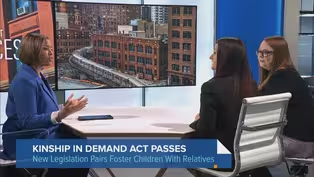Chicago Tonight: Black Voices
New Program Connects Pregnant Patients With Free Doula Services
Clip: 1/8/2025 | 8m 26sVideo has Closed Captions
Black maternal morbidity is up in Illinois. Cook County is working to change that.
Cook County Health is partnering with Prism Health Care to provide pregnant patients with free doula care. It's an effort to help bridge the maternal health gap between Black and White mothers.
Problems playing video? | Closed Captioning Feedback
Problems playing video? | Closed Captioning Feedback
Chicago Tonight: Black Voices is a local public television program presented by WTTW
Chicago Tonight: Black Voices
New Program Connects Pregnant Patients With Free Doula Services
Clip: 1/8/2025 | 8m 26sVideo has Closed Captions
Cook County Health is partnering with Prism Health Care to provide pregnant patients with free doula care. It's an effort to help bridge the maternal health gap between Black and White mothers.
Problems playing video? | Closed Captioning Feedback
How to Watch Chicago Tonight: Black Voices
Chicago Tonight: Black Voices is available to stream on pbs.org and the free PBS App, available on iPhone, Apple TV, Android TV, Android smartphones, Amazon Fire TV, Amazon Fire Tablet, Roku, Samsung Smart TV, and Vizio.
Providing Support for PBS.org
Learn Moreabout PBS online sponsorshipwomen are disproportionately affected by prenatal and postpartum complications.
That's why Cook County Health says it's partnering with prison health care to provide pregnant patients with free doula care.
It's an effort to help bridge the maternal health gap between black and white mothers.
The pilot program is set to start later this year with 10 do list with plans to expand in the future.
Joining us now, our Kristina are women and children services, executive administrator for Cook County Health, Dr. Mary Tate attending physician of obstetrics and gynecology at Cook County Health and Donna Mueller, Cook County commissioner whose district includes parts of the south and southwest suburbs.
Ladies, thanks to all of you for joining us.
I'm Christine are let's start with you.
Please remind folks what a doula is and why they're beneficial to pregnant people who want salute.
Lee doulas basically you could think of them as a support person support an advocate and a person that is that can partner with them through prenatal care, labor delivery postpartum care.
>> It can really enhance the partnership, communication between patients and physicians and their experience throughout health care.
Dr Tate, from your perspective as as an OB how does having a how is having a doula helpful to someone?
>> Going the entire birth process?
It's absolutely invaluable.
It's so important that prior to becoming would myself.
I went through credit program to be doula and it's really important because of all the things that Christina has mentioned, they're really the experts in the emotional and physical support of a patient throughout pregnancy, labor and delivery and postpartum and uniquely qualified to really help patients advocate for themselves.
So it's absolutely vital.
Of course, this is a lot more going on besides just the delivery of the that women can you, they're pregnant.
People get You support with Commissioner Miller.
Why did you think it was important for Cook County health to step in and start this program this Well, it's really important for the health system to partner with our patients and really meet them where they are.
>> And this was great way to establish that Cook County Health can be a leader in reducing the maternal morbidity outcomes that we have here in the state of Illinois and to provide excellent service that we do from the hospital standpoint.
But to give patients an option that they haven't had in the past, we want to improve outcomes.
We want mothers to have the best chance at having a healthy baby and healthy survival for themselves.
And Cook County health will lead the way and making sure that happens.
And you have your own birth story that sort of informs your work in this room.
I'm sure, yes, well, I mean, I it's 21 years ago I had my first son and during that process, it was really something where you have a plan.
I had a birthing plan which I don't even know if we called it that at that time.
But now people are familiar with that concept of having a birthing plan, which include it, you know, not having residents fellows working and so when the fellow came in and asked me multiple questions and one of the questions was, you know, you have used drugs and I said no.
then said, well, are you sure you haven't used drugs?
I no.
>> And then I said White and then to my husband was luckily there with me who is a healthcare provider.
He's a dentist and my husband like, hold on a second that purity asked or that like 3 different times he said want to make sure she understood the question.
Of course, they understand the question.
But that just goes back to where if you headed to lure someone there supporting that could have been probably alleviate it from the very beginning.
But it's all so really misconception and discrimination that black women feel when they go to a health care provider that's not won in their race.
Let's say and asking questions that are derogatory towards you because a preconceived notions about what black women represent.
Of course, we'll get to some culturally the importance of culturally sensitive care as well.
But, you know, the last thing you want to have to do is defend yourself against a question like that when you're in labor.
>> northwestern Medicine study found that in a cohort of 988,480 almost 990,000 birds at 127 hospitals across the state between January 2016 to June 2023, the overall rate of severe maternal complications rose from 1.42% So it's gone up and of that non-Hispanic black patients had more than doubled the severe more maternal morbidity rate at 2.6% versus white patients.
At 1.1% Cristina are I'm gonna come to you with us first.
How can increase in the number of doulas help decrease that disparity?
Yeah.
I think increasing the number do is to really partner with the patient and help you understand what their plan is, what kind of care that they want to help them?
>> You know, feel empowered and help advocate for the care that they deserve.
All right.
been in partnership with their physicians and you Dr. Take night.
have talked about this at length that it's just.
It's a multi-pronged approach, right?
There's the emotional support it is you even though there's also the clinical support?
So I think you from my perspective, I just it's really important to have the advocate in the room for our pregnant patients to really help them get the care that they want and that they deserve.
And just like Commissioner Miller just described, you know, it's important to have that culturally sensitive care as well because I knew administrators are also requesting bilingual to list who talked to me about the importance of of of making sure you're doing probably understands what you're dealing with.
Absolutely any communication is key.
And we know that patients you >> understand in need to receive the care in the language that they understand say whether that be English, whether that be another language, it's that that's, you know, very important, Dr Tate to do a program set to hire 10 doulas to provide this service free of Knowing that there are about 1000 bringing people in Cook County Health System, 10 doulas probably not enough right away but what more can be done to ensure that people who want the service have access to it.
important thing to know about the services that it's really an opt-in service.
You want us to able to any patient who's interested.
So we have multiple touch points in our system.
It which patients are going to be introduced to the service is available.
So we have nurse education visit with patients first, learn that they're pregnant, where they learn all the things about the do's and don'ts in pregnancy.
In that visit, they'll learn about this program.
There's a new visit with the obstetrician.
Well, there again, learn about this program.
There's so many places that we have touch points with patients and to get to the point about 1000 deliveries, 10 doulas.
You know, that's not all happening.
At one time.
They move through the cycle of care at different times in patients.
Enter our care at different times.
So a patient could come in who have had people care and show up and are ready to deliver and we can be able to provide that service So not gonna use service as long if they're in train later you could come in and you know, with the positive pregnancy test very early on and be able to opt into that service.
And so we're just excited to get started.
I mean, to be able to expand the amount of services that we can provide in the wraparound support to breathing people.
We're over the What would you say are some of the biggest challenges that black women face in securing proper prenatal and postpartum care in about 30 seconds.
you know, there's so many things, a big part of it relates to insurance being a safety net hospital in the city.
Fortunately able to get patients and get them the integrity, insurance and care for them regardless of where they are.
At that point.
But then when we think about black women in particular, part of it is that a lot of patients don't up having insurance access before they get pregnant.
So patients come into pregnancy with different connick illnesses that we need to make sure that we're addressing in short order and that we make sure that after they deliver, they get linkage to services to make sure that they're taken well care of for hypertension or diabetes or the myriad of issues that might have uncovered during a pregnancy.
So Commissioner Miller, we've got about 25 seconds.
The budget is allocating million dollars for this pilot program.
What's next?
Well, what's next making sure that it's implemented and the do is get on board that.
I do have to say that I really think that this is how we get things done in Cook County.
We start off with getting it in the budget.
>> So that was the first step and then making sure that we have to pull through through the hospital system.
And I'm really proud of myself and my colleagues for making sure that we have this program in our educating so many more patients.
And we already had the team in place to do it
Bill Makes It Easier for Kids in Foster Care to Live With Relatives
Video has Closed Captions
Clip: 1/8/2025 | 8m 34s | The KIND Act unanimously cleared the Illinois Senate and House. (8m 34s)
Illinois' New Legislative Session Begins
Video has Closed Captions
Clip: 1/8/2025 | 3m 56s | The 104th General Assembly was inaugurated. (3m 56s)
Providing Support for PBS.org
Learn Moreabout PBS online sponsorship
- News and Public Affairs

Top journalists deliver compelling original analysis of the hour's headlines.

- News and Public Affairs

FRONTLINE is investigative journalism that questions, explains and changes our world.












Support for PBS provided by:
Chicago Tonight: Black Voices is a local public television program presented by WTTW

